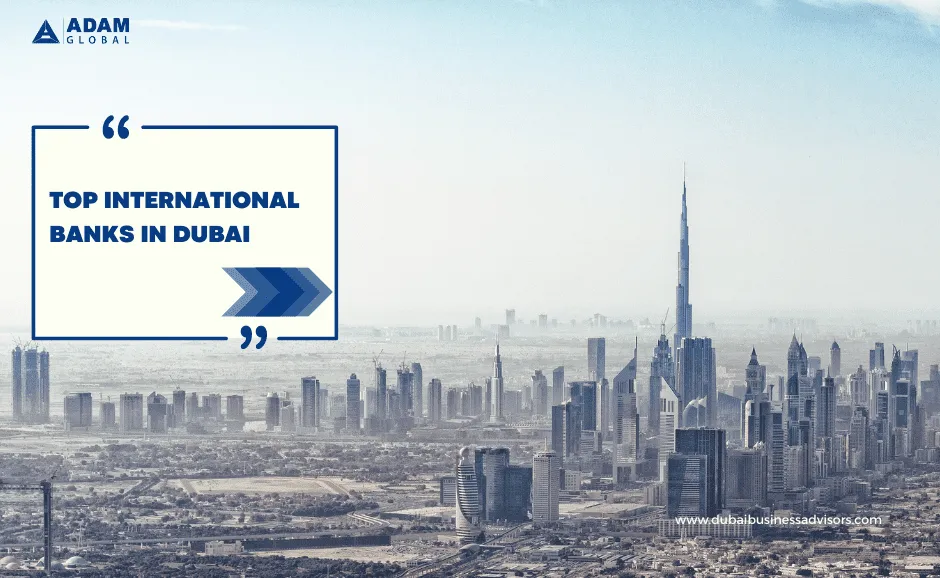Dubai has always been on top of its game when it comes to business facilitation and government support, which has, in turn, brought many global companies to Dubai and continues to bring in new ones. Dubai earned a high score of 94.8 in The World Bank’s Ease of Doing Business ranking in 2020, based on 10 factors and ranks in the top 20 easiest countries to do business in. A stable financial system, investor-friendly legislation, visa reforms, free zones, well-advanced infrastructure, and availability of human resources make Dubai an ideal option for business owners.
Despite the severe pandemic, Dubai has consistently grown as a global trading hub and ultimate investment destination in many sectors such as tourism, trading, event management, export, logistics, import, hospitality, financial services, construction, and many more. Known for reputable regulation, a low tax environment, and a government that thrives on foreign investment, the UAE is both convenient and economically efficient as a business destination. As investments increase ahead of Dubai’s hosting of the World Expo in 2020, real estate prices decrease and markets continue to flourish, the UAE offers a platform for businesses and investors with global ambition.
Dubai was the only city in the Middle East to rank among the top cities for entrepreneurs in a survey of 200 international cities ranked destinations by factors that promote entrepreneurial ecosystems, such as economic freedom, technology infrastructure, logistics, female entrepreneurship and access to markets.
Here are a few reasons why you should migrate your business to Dubai in 2021:
1. Ease of doing business
UAE is considered to be a prime launch-pad for countries looking to access markets around the world. Its location and accommodating time zone (GMT +4) provide businesses seeking access to markets in Africa, Asia, and Europe with a regional and business-centric hub from which to operate. It is also ranked 11th in the World Bank’s 2019 global ‘Ease of Doing Business’ listings, the highest-ranking nation in the Middle East and Africa region.

Among the most important factors that attract and enable businesses to flourish in the UAE is its strong network of international tax treaties. There are more than 115 double taxation treaties (DTAs) in place with other countries, ensuring that residents and businesses are not taxed twice on the exchange of goods, capital, and services. As a result of this extensive network, cross-border trade and investment are made easier.
2. Foreign nationals to have 100% ownership of companies undertaking business in mainland UAE

Since 1st June 2021 foreigners opening businesses in Dubai do not need Emirati shareholders or agents. The requirement initially was that 51% of shares in a company be owned by one or more UAE nationals, whether natural or legal, but this rule has been repealed. Foreign entity owners may now hold 100% ownership of single-shareholder entities that previously had to be dominated by UAE citizens. Foreign investors are no longer required to hire nominees or other structures, thus evading cumbersome systems, legal uncertainty, and additional costs.
3. Introduction of a virtual work program

Foreign working professionals can live in Dubai with their families while still working remotely for their overseas employers thanks to the Dubai Virtual Working Program. In addition to allowing remote workers the chance to relocate, Dubai also provides them with powerful digital infrastructure, quality lifestyle, robust connectivity, and global network opportunities, and zero income tax for individuals.
It has been designed to be an opportunity for employers facing the unprecedented challenges of the COVID-19 as well as a growth in non-traditional workers. It is a good idea for employers to consult their immigration provider or other related authorities to help strategize and evaluate potential risks.
Requirement for virtual program are as follows:
- A passport with a minimum six-month validity.
- Health insurance with coverage in the UAE.
- Employment verification from a current employer with a 1-year contract.
- A minimum wage of $5,000 a month.
- A payslip should also be provided by the candidate.
- 3 preceding months’ bank statements .
4. Exciting Visa reforms

The government has introduced many new attractive visa reforms. In January, the UAE announced a new law offering Emirati citizenship to foreigners.
These are all the recent visa reforms that have been announced:
Remote work visa: This visa allows professionals from all over the world to live and work remotely from the UAE, regardless of the location of their companies. It is valid for one year. they are permitted to stay in the UAE under their sponsorship.
Multi-entry tourist visa: The holder of a multi-entry tourist visa can stay in the country for up to 90 days at a time, which can be extended by 90 days. With this visa, any nationality can enter and exit the country however many times as needed for a period of five years.
UAE long-term visa: His Highness Sheikh Mohammed bin Rashid Al Maktoum, Vice-President and Prime Minister of the UAE and Ruler of Dubai, has announced a new citizenship law, which allows the following categories of residents and their families to apply for long-term residence visa:
- Investors.
- Doctors
- Scientists
- Artists
- Engineers
- Authors
- Students who are getting high scores (3.8 or more) in approved universities will also get the long-term Golden Visas.
These visas are issued for 5 or 10 years.
Foreign Students can sponsor their family members: A cabinet resolution was approved on January 24, under which foreign university students can sponsor their families, providing they are able to manage suitable housing.
Work in Dubai visa scheme: Dubai launched its Work-in-Dubai residency scheme in October last year. It allows overseas remote workers to live in the emirate while serving employers back home. It will provide remote workers, along with their families, with an opportunity to relocate to Dubai and experience the strong digital infrastructure that will facilitate seamless connectivity.
Retirement visa: Retired residents over the age of 55 will be granted a long-term visa for five years. The following requirements must be met by a retiree in order to be eligible:
- Savings of at least Dh1 million
- Invest in a Dh2 million property
- A minimum monthly income of Dh20,000 is required .
Medical treatment visa: In 2017, the country approved a medical visa program, allowing foreign patients to receive 90-day visas as individuals or in groups. Basically, this is an update to the visa. In most cases, these are renewable if the hospital in which they got treated requests them.
Special visa: A one-year residence visa was issued by the UAE Cabinet, which allowed citizens of countries suffering wars and disasters to seek residency in the country. Furthermore, a one-year renewable visa is available to surviving spouses and their children without a sponsor.
5. Invest Dubai: Start your business in 5 minutes and one step.
Invest Dubai, a digital platform for entrepreneurs looking to set up business in Dubai, was launched by His Highness Sheikh Mohammed Bin Rashid Al Maktoum, Prime Minister and Vice President of the UAE and Ruler of Dubai.

Over 2,000 commercial activities and various types of licenses are covered by the platform. Dubai has taken another step forward in making itself the destination of choice for entrepreneurs all around the world with this new initiative. On the Invest Dubai platform, you’ll find all the details, requirements, and processes essential to starting a business in Dubai. For entrepreneurs, the platform offers details on various licensing requirements, as well as funding programs.
6. Reduction in the cost of doing business in the UAE.
In an effort to offset the impact of the Coronavirus pandemic on the business sector, the UAE’s Ministry of Economy has reduced fees for 94 services. It covers services in innovation, business, investment, production, trade, and import/export activities. Commercial registration, trademark and intellectual property services, as well as fees associated with commercial agencies and auditors, are among the most common.
7. Knowledge-based economy
The UAE has launched state-sponsored initiatives like ‘UAE Vision 2021’ and ‘National Innovation Strategy’. ‘Vision 2021’ aims to achieve excellence in these six national priority areas based on the desire to transition to a knowledge-based economy:
- A world-class healthcare system
- A top-notch education system
- Environment and infrastructure that are sustainable
- A cohesive society and a preserved identity
- A cohesive society and a preserved identity
- Developing a competitive knowledge economy
UAE’s government has been encouraging banks to expand credit activity in non-oil industries while strengthening the regulatory frameworks in each key sector to push the evolution of these sectors forward. With both strategies, business competition and investment are hoped to increase.
8. Digitization initiatives
In recent years, the UAE government has taken steps to establish a strong digital economy, which contributes 4.3% to the nation’s GDP. In the field of technology and adoption of modern technologies, it’s widely regarded as one of the most advanced countries in the world. Digital transformation has not only helped companies adapt to new realities in the current environment, but has also sparked new innovations. Due to Covid-19 lock down measures and the need for digital solutions for carrying out trade transactions and keeping goods moving, electronic banking platforms has been introduced, where documents can be completed, processed and tracked electronically, this has been especially advantageous.
9. A dual licensing system

The initiative allows companies in free zones to operate both in the FTZ and on the mainland, provided they have received a no-objection certificate from the free zone authority and approval from the respective DEDs.
- In Dubai DMCC free zone alone houses approximately 15,000 member companies and contributes more than 10% to Dubai’s GDP.
- Companies operating offshore and onshore in the past had to meet specific legal and geographical requirements. Businesses often complained that to meet these conditions, they were required to change their operating model and reduce their profit-earning capacity significantly. This new initiative will now remove all restrictions and conditions, and companies may get approval for a dual license within 3 business days. Under this scheme, businesses across the region have the option of operating in the UAE’s Free Trade Zones (FTZs), as well as onshore in the UAE.
10. Continued implementation of the Base Erosion and Profit Shifting (BEPS Action Plan).
As of 16th May 2018, the United Arab Emirates (“UAE”) was a participant in the OECD Inclusive Framework on Base Erosion and Profit Shifting (“BEPS”). This brings the total number of countries to 116. As a member of the Inclusive Framework, the UAE has committed to implementing the following four BEPS minimum standards:
- Action 5: Countering Harmful Tax Practices More Effectively, Taking Transparency and Substance into Consideration.
- Action 6: Taking Actions to Prevent Granting of Treaty Benefits in Inappropriate Circumstances.
- Action 13: Documenting Transfer Pricing and Country-by-Country Reporting (“CbCR”).
- Action 14: Increasing the effectiveness of dispute resolution mechanisms.
Furthermore, the UAE will also need to submit to and participate in peer reviews related to the implementation of BEPS Action Points. In the immediate to short term, this would include the minimum four standards.
In order to comply with the minimum standards, the UAE has already implemented certain measures. To ensure compliance with the minimum rules, the UAE would also need to do the following:
- The UAE should update its legal and regulatory framework to allow for the collection and sharing of information and to implement CbCR requirements
- Adapt the UAE’s double tax agreements (“DTAs”) to: (i) prevent abuse, and (ii) adopt mutual agreement procedures (“MAPs”).
- Establish UAE-specific MAP guidelines and procedures.
The UAE has always been a place of technological innovation and small to medium-sized companies (SMEs), and it appears that it’s on the verge of an exciting move forward. Even though it is still laying the physical landscape for the future, the UAE is doing all it can to welcome foreign investment with its progressive, government-driven socioeconomic initiatives, record fiscal budgets, and increasingly hospitable business climate.
In 2021, if you plan to migrate/expand your business to a better country, Dubai should be your first choice. With its friendly business environment, fast-growing opportunities, and economic stability, the city is the perfect place to do business. Dubai’s continuous and ambitious changes have made it easier for business owners, business service providers, and entrepreneurs to set up a business. Our representative at Adam Global Dubai can help you get started or migrate your business, and we will assist you throughout.



